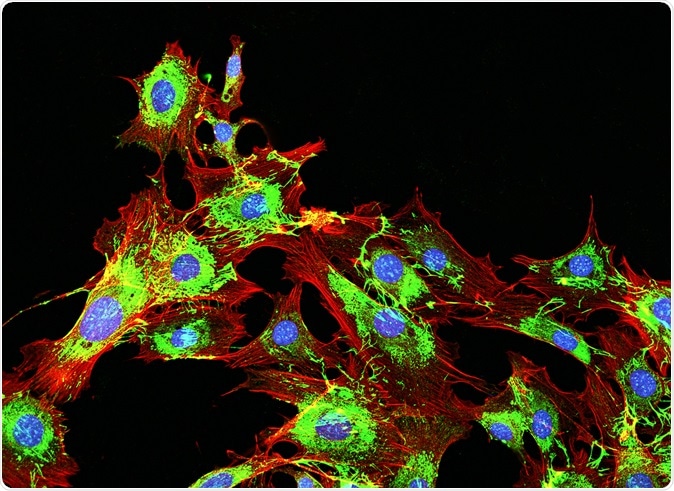Researchers from the Baylor College of Medicine and Harvard Medical School have found a novel mechanism to explain the resistance of certain breast cancers that spread in the major organs of the body. They hope that this would help develop new therapeutic strategies to treat the cancer.

Imaging of metastatic cancer cells spreading on the surrounding tissue. Image Credit: DrimaFilm / Shutterstock
The study titled, “FOXA1 upregulation promotes enhancer and transcriptional reprogramming in endocrine-resistant breast cancer,” was published in the Proceedings of the National Academy of Sciences.
The study authors explained that there is an overactivity of Forkhead box A1 (FOXA1) signalling which has been connected to endocrine resistant breast cancers. This is also associated with the spread or metastasis of these cancers. They wrote, “FOXA1 augmentation, including by genetic aberrations, drives aggressive phenotypes of estrogen receptor-positive (ER+) breast cancer.”
They noted that HIF-2a is a key mediator that helps the FOXA1 to become active in these cancers. The team also helped develop an inhibitor of this key mediator HIF-2a. This inhibitor has been tried on animal studies and has shown efficacy in treatment of advanced renal cell carcinoma and recurrent glioblastoma. This inhibitor molecule has also shown success in preventing the spread of the endocrine-resistant breast cancer cells that show high activity of FOXA1 explained the researchers.
One of the corresponding authors Dr. Rachel Schiff, associate professor of medicine and the Lester and Sue Smith Breast Center at Baylor, explained, “About 75 percent of breast cancers have estrogen receptors, hence they are called estrogen receptor positive (ER+). Original ER+ breast cancer cells depend on estrogen to grow, and therapies that make the estrogen unavailable to cells, called hormone therapies, can result in long-term remission in some patients. Tamoxifen, one of several types of hormone therapy, works by binding to and blocking the estrogen receptor on cancer cells.” She added that many women who have metastatic diseases eventually relapse despite having shown response to initial hormonal therapy. Their tumours seem to have developed a resistance to the hormone therapy.
Schiff and her researcher team had shown in earlier studies that these tumours that are resistance to hormone therapy have a high expression of FOXA1 compared to breast cancer cells that are more susceptible to be killed by the hormone therapies. They had speculated that this could be the reason behind their resistance and eventual spread. To look at the details of FOXA1 expression the team then undertook genetic studies.
First author of the study, Dr. Xiaoyong Fu, assistant professor of molecular and cellular biology and part of the Lester and Sue Smith Breast Center at Baylor, explained, “Working with breast cancer cell lines in the laboratory, we discovered that FOXA1 reprograms endocrine therapy-resistant breast cancer cells by turning on certain genes that were turned off before and turning off other genes. The new gene expression program mimics an early embryonic developmental program that endows cancer cells with new capabilities, such as being able to migrate to other tissues and invade them aggressively, hallmarks of metastatic behaviour.” They wrote in the paper, “The hyperactive FOXA1/HIF-2α transcriptional axis is observed to be largely nonconcurrent with the ESR1 mutations in clinical ER+/HER2− metastatic BC (breast cancer) datasets, suggesting different mechanisms of resistance..”
They further noted that this FOXA1 activates several enhancers and is not alone in its activities. These enhancers work in synchrony to activate the whole genome so that it can re-programme the cell explain the researchers. HIF-2a is one of the major enhancers that work alongside FOXA1. This activates specific genetic pathways and causes metastasis and results in poor clinical outcome of the patients say the researchers.
The team wrote in explanation, “Up-regulated FOXA1 employs superenhancers (SEs) to synchronize transcriptional reprogramming in endocrine-resistant breast cancer cells, reflecting an early embryonic development process. We identify the hypoxia-inducible transcription factor hypoxia-inducible factor-2α (HIF-2α) as the top high FOXA1-induced SE target, mediating the impact of high FOXA1 in activating prometastatic gene sets and pathways associated with poor clinical outcome.”
Schiff is also a member of the Dan L Duncan Comprehensive Cancer Center at Baylor. She added, “In collaboration with our colleagues from Harvard Medical School, we explored the possibility of transferring these findings to the clinic. We analyzed clinical metastatic breast cancer datasets and found reprogramming events that were similar to those found in our endocrine-resistant breast cancer cell models.” She added that gene therapies targeting these pathways could help patients with these cancers.
The authors of the study wrote in conclusion, “Our study has uncovered high FOXA1-induced enhancer reprogramming and HIF-2α–dependent transcriptional programs as vulnerable targets for treating endocrine-resistant and metastatic breast cancer.”
Journal reference:
FOXA1 upregulation promotes enhancer and transcriptional reprogramming in endocrine-resistant breast cancer Xiaoyong Fu, Resel Pereira, Carmine De Angelis, Jamunarani Veeraraghavan, Sarmistha Nanda, Lanfang Qin, Maria L. Cataldo, Vidyalakshmi Sethunath, Sepideh Mehravaran, Carolina Gutierrez, Gary C. Chamness, Qin Feng, Bert W. O’Malley, Pier Selenica, Britta Weigelt, Jorge S. Reis-Filho, Ofir Cohen, Nikhil Wagle, Agostina Nardone, Rinath Jeselsohn, Myles Brown, Mothaffar F. Rimawi, C. Kent Osborne, Rachel Schiff Proceedings of the National Academy of Sciences Dec 2019, 201911584; DOI: 10.1073/pnas.1911584116, https://www.pnas.org/content/early/2019/12/10/1911584116